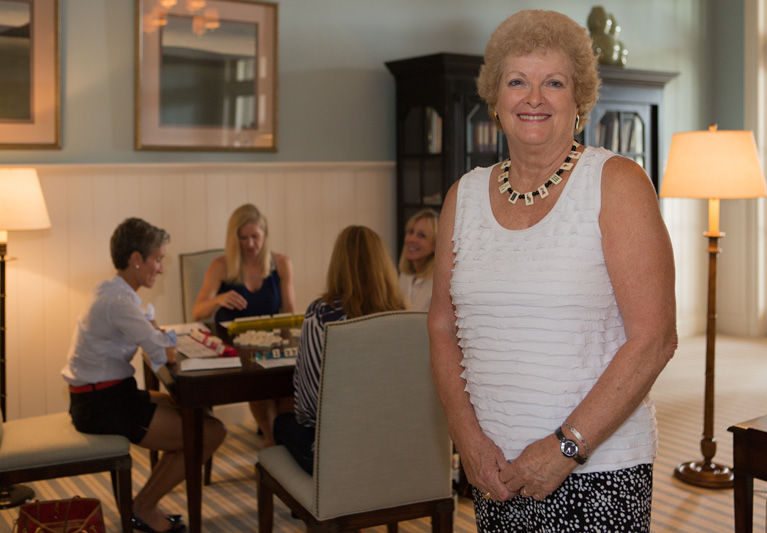
There’s always an abundance of enthusiasm and opportunities to play bridge, tennis and golf in Vero Beach. But lately what has been capturing the attention of people here is American mah jongg – a spin-off of the ancient Chinese game.
It sounds exotic. But more and more people are pulling a chair up to the game table to apply their strategy skills and brain power to American mah jongg, moving the once esoteric game into the mainstream.
Attesting to that fact is Melody Gabriel, a local instructor who goes to homes, clubs and communities to share her knowledge of the game. Gabriel designed a curriculum consisting of four 2 1/2 hour lessons, and offers private coaching. The rate is $15 to $20 per person, per lesson.
“It has snowballed,” said the 73-year-old former newspaper editor who deems teaching mah jongg an accidental second career of sorts. “I started teaching at someone’s kitchen table and now I’ve taught well over 200 students over the last couple of years at homes and private clubs.”
American mah jongg is distinct from Asian mah jongg in several ways. American mah jongg utilizes racks to hold each player’s domino-like items called tiles, jokers and “hands and rules” score cards. It has several distinct gameplay mechanics such as “The Charleston,” which is a set of required passes, and optional passing of the tiles.
American mah jongg is played with four players using tiles stamped with Chinese symbols. The goal of the game is to be the first to match one’s tiles to a specific hand from the National Mah Jongg League’s (NMJL) annually distributed scorecard, by picking and discarding, much like in the card game gin rummy.
No partners are required. Four is an ideal number at the mah jongg table. The card is placed in front of each player and on it is a series of plays the person can make. Each player has 13 tiles in his or her rack. The goal is to get 14 tiles to make mah jongg.
Gabriel’s students are mostly middle-aged to senior women, though there are some men in her classes. “Mostly they are friends who want to get together to do something other than play golf, tennis and bridge,” she said. “They are looking for something different.”
Gabriel is one of them. She is a Silver Life Master, signifying an accomplished bridge player and former president of the prestigious Vero Beach Duplicate Bridge Club, where she plays several times a week. She enjoys the diversion of playing and teaching mah jongg.
“I don’t show students the card at first because I don’t want them to be overwhelmed,” said Gabriel. “The first class is complicated. I tell people not to be discouraged.”
Usually after four lessons people are equipped enough to play the game. However, further coaching to learn more strategy is often helpful.
Unlike in duplicate bridge where there is always something else to learn and try, in mah jongg, the only thing that changes is the annual NMJL card that is issued each year.
Various private clubs and communities including Orchid Island Golf & Beach Club, Windsor Country Club, John’s Island Club, Quail Valley River Club, The Moorings Yacht & Country Club, Grand Harbor and Bent Pine offer mah jongg.
Orchid Island Golf & Beach Club member Jayne Drucker has taught some 54 people over the years. She organizes the weekly mah jongg session at the club in which 32 people participate, and is involved with the annual mah jongg tournament hosted by Temple Beth Shalom each March, which draws players from Melbourne to Hutchinson Island.
“In the last two years mah jongg has become exceedingly popular throughout the country,” she said.
Drucker learned from her mother-in-law in Long Island decades ago and got her first mah jongg set for her birthday one year. She would get together with other young mothers in her neighborhood and play mah jongg while their babies napped. She stopped playing for 40 years during her career as a psychologist, and in recent years picked it up again and has taught many others. “It’s like riding a bike,” she said. “You never forget.”
“It’s taking the country by storm,” she said of the game, adding that people like the sensuality of using the tiles versus cards as you would in other games.
During her time living overseas, Mary Marshall, who plays at Quail River Valley Club, observed the popularity of the game among ex-pats residing in Japan. She enjoys the game because of the swift decision-making and maneuvering required.
“I’m addicted to it,” she said. “I like games with strategy involved. I decided on mah jongg because I wanted to be able to talk during the game,” she added. “I’ll save bridge for later in life.”
Mary Hogan has always enjoyed card and board games and for a long time wanted to learn mah jongg. The retired captain with the Indian River County Sheriff’s Office figured it was as good a time as any to start, and learned from Gabriel in a private group. That was four years ago. The 59-year old Hogan, who Gabriel says was one of her star students, is now her teaching assistant, and plays with an experienced group of mah jongg players she deems the “mah jongg mavens.”
“It looks like the Greek alphabet to you at first and you wonder, ‘What did I get myself into?'” she said. “But once it’s open to your brain, you’re hooked.”
For instruction, contact Melody Gabriel at [email protected]



